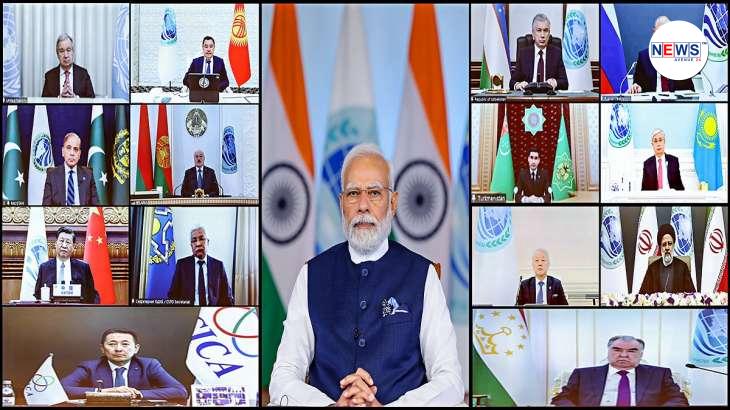
PM Modi’s veiled attack on China, Pakistan over cross-border terrorism at SCO meet 2023: Why is it important?
‘”Some countries use cross-border terrorism as an instrument of their policies and give shelter to terrorists,” the Prime Minister Modi said adding that the SCO should not hesitate to criticise such countries and “there should be no double standards on terrorism.”
PM Modi at SCO 2023: At the Shanghai Cooperation Organisation (SCO) meeting hosted by India on Tuesday, Prime Minister Narendra Modi took a veiled jibe at Pakistan and China by asserting that the eight-member bloc should condemn the use of cross-border terrorism.
The 23rd Summit between the SCO member states was attended by Chinese President Xi Jinping, Pakistan Prime Minister Shehbaz Sharif and Russian President Vladimir Putin. Iran, Belarus, and Mongolia have also been invited to participate as observer states. Turkmenistan has also been invited as the guest of the Chair, as is tradition for the SCO.
India assumed the rotating chairmanship of the SCO at the Samarkand Summit in September 2022. The theme under India’s chairship is SCO-SECURE. The acronym “SECURE,” coined by PM Modi at the 2018 SCO Qingdao Summit, inspired India’s SCO chairship theme. Its initials stand for S: Security, E: Economic development, C: Connectivity, U: Unity, R: Respect for sovereignty and territorial integrity, E: Environmental protection.
PM Modi’s remarks to Pakistan and China on terrorism
In an apparent attack on Pakistan and China, PM Modi underscored the threat of terrorism to regional and global peace in his virtual address.
“We will have to fight against terrorism…Some countries use cross-border terrorism as an instrument of their policies and give shelter to terrorists. SCO should not hesitate to criticize such countries. SCO countries should condemn it. There should be no double standards on terrorism,” said the Prime Minister.
He also called on SCO member countries to not hesitate in condemning countries that employ cross-border terrorism as ‘policy instruments’ and provide shelter to terrorists.
“Some countries use cross-border terrorism as an instrument of their policies and give shelter to terrorists,” Prime Minister Modi said adding that the SCO should not hesitate to criticize such countries and “there should be no double standards on terrorism.”
During his address, the Prime Minister also highlighted that the SCO has emerged as a crucial platform for peace, prosperity, and development in Eurasia in the last two decades.
The importance of PM Modi’s remarks at SCO
PM Modi’s remarks towards cross-border terrorism come at a crucial juncture where Pakistan has been repeatedly called out for fuelling cross-border terrorism and harboring terrorists on their territory, while China is preventing global sanctions against such terrorists. Soon after the Prime Minister’s visit to the United States and his meeting with President Joe Biden last month, a joint India-US statement unequivocally condemned terrorism and violent extremism in Pakistan.
“The United States and India stand together to counter global terrorism and unequivocally condemn terrorism and violent extremism in all its forms and manifestations. President Biden and Prime Minister Modi reiterated the call for concerted action against all UN-listed terrorist groups including Al-Qa’ida, ISIS/Daesh, Lashkar e-Tayyiba (LeT), Jaish-e-Mohammad (JeM), and Hizb-ul-Mujhahideen,” read the joint statement.
The joint statement also called on Pakistanto take urgent action to ensure that no piece of its territory is used for launching terrorist activities and called for the perpetrators of the 26/11 Mumbai incident and the Pathankot attacks to be brought to justice.
“They noted with concern the increasing global use of unmanned aerial vehicles (UAVs), drones and information and communication technologies for terrorist purposes and reaffirmed the importance of working together to combat such misuse,” it added.
Following the joint statement. US Department of State spokesperson Matthew Miller reiterated that the US will continue to force Pakistan to dismantle militant bases from its soil.
As Pakistan continues to be criticized for harboring terrorist organizations, its go-to friend China has prevented these terrorists from being blacklisted and blocked several proposals at the United Nations to take action against such organizations or individuals. Last month, China blocked a proposal at the United Nations proposed by India and the US to designate the 26/11 Mumbai terror attack accused Pakistan-based Lashkar-e-Taiba terrorist Sajjid Mir as a global terrorist.
Mir, believed to be in his mid-40s, is one of India’s most wanted terrorists and has a bounty of $5 million placed on his head by the US for his role in the 26/11 Mumbai terror attacks. In June last year, Mir was jailed for over 15 years in a terror-financing case by an anti-terrorism court in Pakistan. Pakistani authorities had in the past claimed Mir had died, but Western countries remained unconvinced and demanded proof of his death.
Despite repeated attempts by India to blacklist Pakistan-based terrorists under the sanctions committee of the UN Security Council, all of these proposals have been blocked by China. It has repeatedly blocked proposals aimed to designate proscribed terrorists like Mir, JeM chief Maulana Masood Azhar, LeT leader Hafiz Saeed and Abdul Rehman Makki.
In reaction to China’s move to block the latest proposal on Mir, India underscored that the world would not overcome the challenge of terrorism if countries deliberately oppose the proposals.
“…If we cannot get established terrorists who have been proscribed across global landscapes listed under security council architecture for pour geopolitical interest, then we do not really have the genuine political will needed to sincerely fight this challenge of terrorism..,” said Prakash Gupta, Joint Secretary, Ministry of External Affairs.
News Sources – India Tv News





